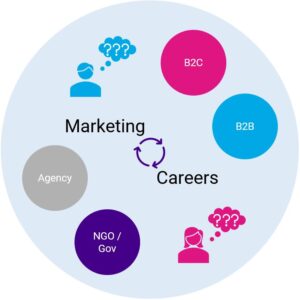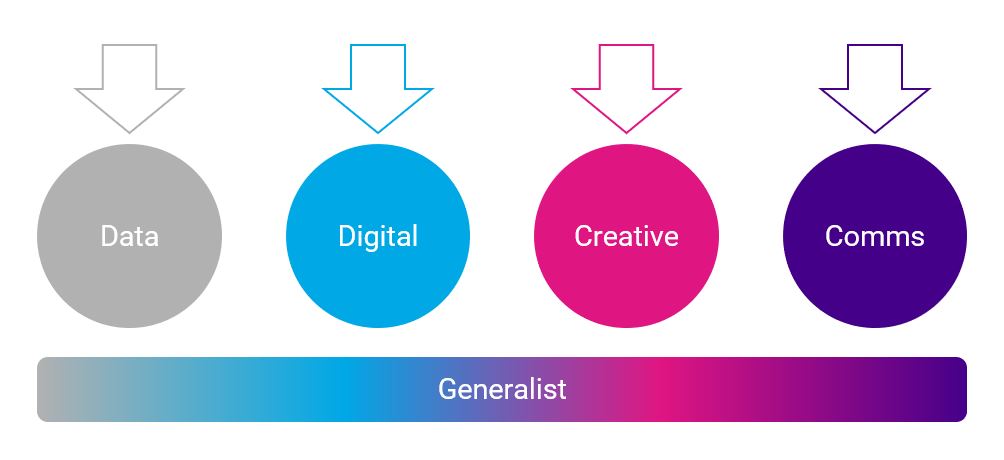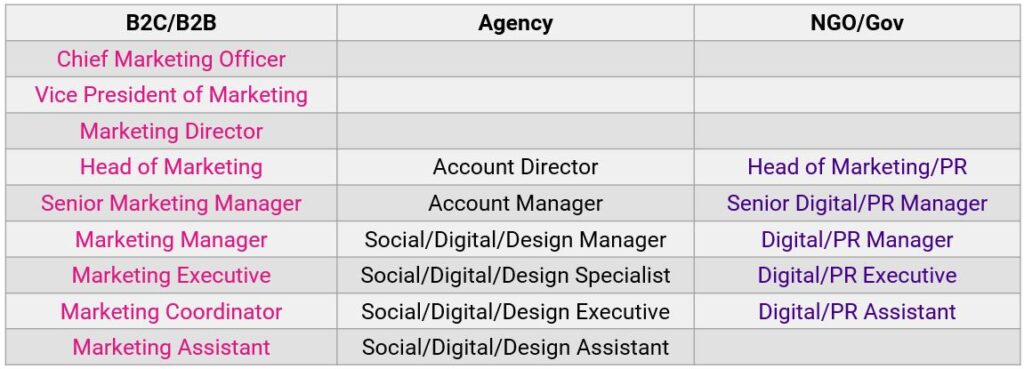Following on from our recent talks to a school and college, students are keen to find out what awaits in marketing. Given that we see so many approaches from students, agencies and others, we just had to write about it. Read on to hear our thoughts on marketing careers and the skills you need to succeed.
Note: we do not advocate for any of the professional bodies in marketing in this article.
Where’s it at in marketing careers?
Okay, so that didn’t sound as hip as we intended. There is still an important question to answer here. But first, we need to understand what skills you have and what you want to be. Where do you see yourself in 5, 10 or 15 years? It sounds like a cheesy question but marketing is one of the broadest careers around and the range of skills is profound.
Although not exhaustive, you broadly have 4 choices for marketing careers:
- B2C – Business-to-consumer
- B2B – Business-to-business
- Agency – Digital/Creative/Media/Social/PR etc
- NGO/Gov – Non-gain organisations (i.e. charities) or public sector
In general, the highest salaries are in senior B2C marketing roles followed by B2B but there are a few exceptions. Many agency and NGO roles pay a little less than their private sector counterparts and the general expectation is the same for those in public service.
This is depicted in the following diagram.

What is your marketing field of preference?
Okay, so you know what sort of industry and organisations you may wish to join. Hopefully, they reflect your values and attract you to join them. But what type of roles are you best suited for, both in terms of skills and personality?
We have broadly categorised most marketing careers into 4 clear preferences, or leanings, which are:
- Data – A preference for facts, figures, processes, research or analysis.
- Digital – A preference for digital technologies, online platforms, social media etc.
- Creative – A preference for artistic or creative pursuits and things that inspire people.
- Comms – A preference for communicating, writing, relationships and brands.
There is also the generalist who has a broad range of skills. These are typically suited to small businesses where you do a bit of everything or complex roles in large organisations where you manage a broad range of responsibilities. Ultimately, this may lead to the top job, if that is your aim.

What role is right for my skills?
There are a plethora of marketing roles and we can’t cover all of them here. Before we even get into the subject of what a marketing consultant knows and does, let’s have a look at some examples.
Most businesses have a wide range of pay grades that underpin a vast array of job titles that describe the specialism or generalist’s level of seniority. These are either divisional roles, such as a marketing executive that manages everything marketing for a product or department, or functional roles, such as a brand manager that covers multiple services and departments. A marketing manager could have responsibilities as broad as managing people, budgets, agencies and reporting. A digital marketing manager may have the same grade but focus on the website, online advertising and social media.
Marketing agencies tend to have less in the way of grades and more junior roles tied to specialisms. Where a business may have many marketing executives or managers, an agency will tend to have fewer managers and they oversee groups of specialists. The roles are usually functional in agencies (but may become divisional in the largest agencies where teams may be ‘ring-fenced’ to a contracted client). For example, a design manager may oversee a team of graphic designers that deliver digital designs and content or print for multiple clients. There is also account management which is usually a hybrid of sales and service.
Charity roles tend to focus on fundraising and inspiring content. Public sector roles tend to focus more on communications and PR.
Below is a selection of roles (not exhaustive) that may exist in various fields.

Where are the skills gaps in marketing careers?
According to the Lloyds Digital Skills Index, 52% of the workforce lack workplace digital skills. Furthermore, Robert Half’s 2021 annual National Employment survey suggests that digital advertising, CRM and social media are in need. However, don’t go thinking that everything is digital. They also cite much-needed basic marketing and soft skills such as influencing, data analysis, forecasting and business acumen.
Another unseen shortage of skills involves the latest social media and ‘online campfire’ trends. Many B2C businesses have been slow to leverage the likes of TikTok, Twitch, Roblox and even Fortnite communities. There is a clear opportunity here for Gen-Z to educate the big B2C brands.
Furthermore, given the breadth of skills required from Marketing Director to CMO, there are traditional marketing techniques to think about for marketing leaders. Crafting effective marketing strategies and achieving marketing goals requires expertise in research, planning, analysis and budgeting. There is also the small matter of the impeccable soft skills required, such as stakeholder management, project management and public-speaking.
Do I fly solo or work for someone else?
Ultimately, the same basic principles that showcase your value to a potential employer are very similar to what prospective clients look for when you are self-employed. Qualifications, experience, testimonials and even a portfolio of work are helpful to have. If you lack the experience or qualifications, it will hamper your search for a job or you will start at a lower level. When you work for yourself, these things matter a little less but you need to showcase your talent much more upfront.
As a marketing consultancy, we understand this dilemma. Moving from a mentality of working for someone else to managing everything yourself is quite a change. Our two founders have around 40 years’ experience in marketing and business. This gives them experience in hands-on tasks when they started out to managing large teams and interacting at board-level before creating Think Beyond. If you dislike job interviews, working for yourself can feel like Groundhog Day with each new prospect.
In terms of skills, a marketing consultant is either a prolific expert in their specialism or a highly-experienced and qualified generalist. We see ourselves as the latter which means we can serve the broadest range of clients possible. In summary, we have seen most things from the top to the bottom so we can work with marketing executives through to CMOs.
Supporting skills when you need it
Think Beyond is a management consultancy in Cheshire. We offer advice, consulting and some agency services. We believe in nurturing talent, so we provide a range of short and bespoke marketing training courses for budding executives to aspiring leaders.
If you would like to request more information to support your career, please email sales@think-beyond.co.uk.
Also, you can complete our 30-second contact form to request a call back. Unfortunately, we only provide training to those who provide a valid work email address.
Finally, why not check out some of our future webinars and networking sessions.

